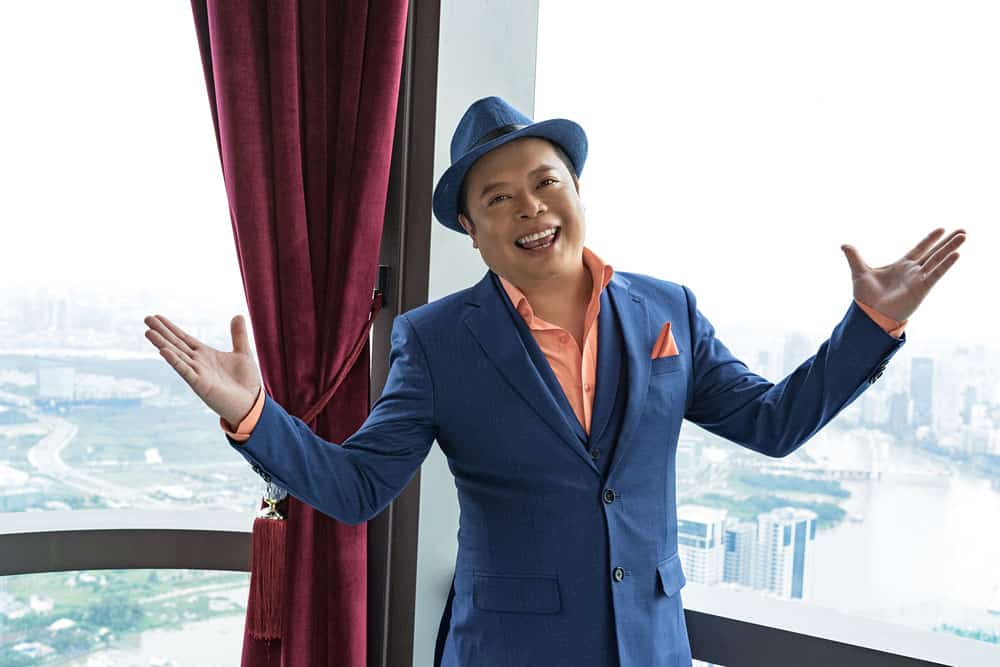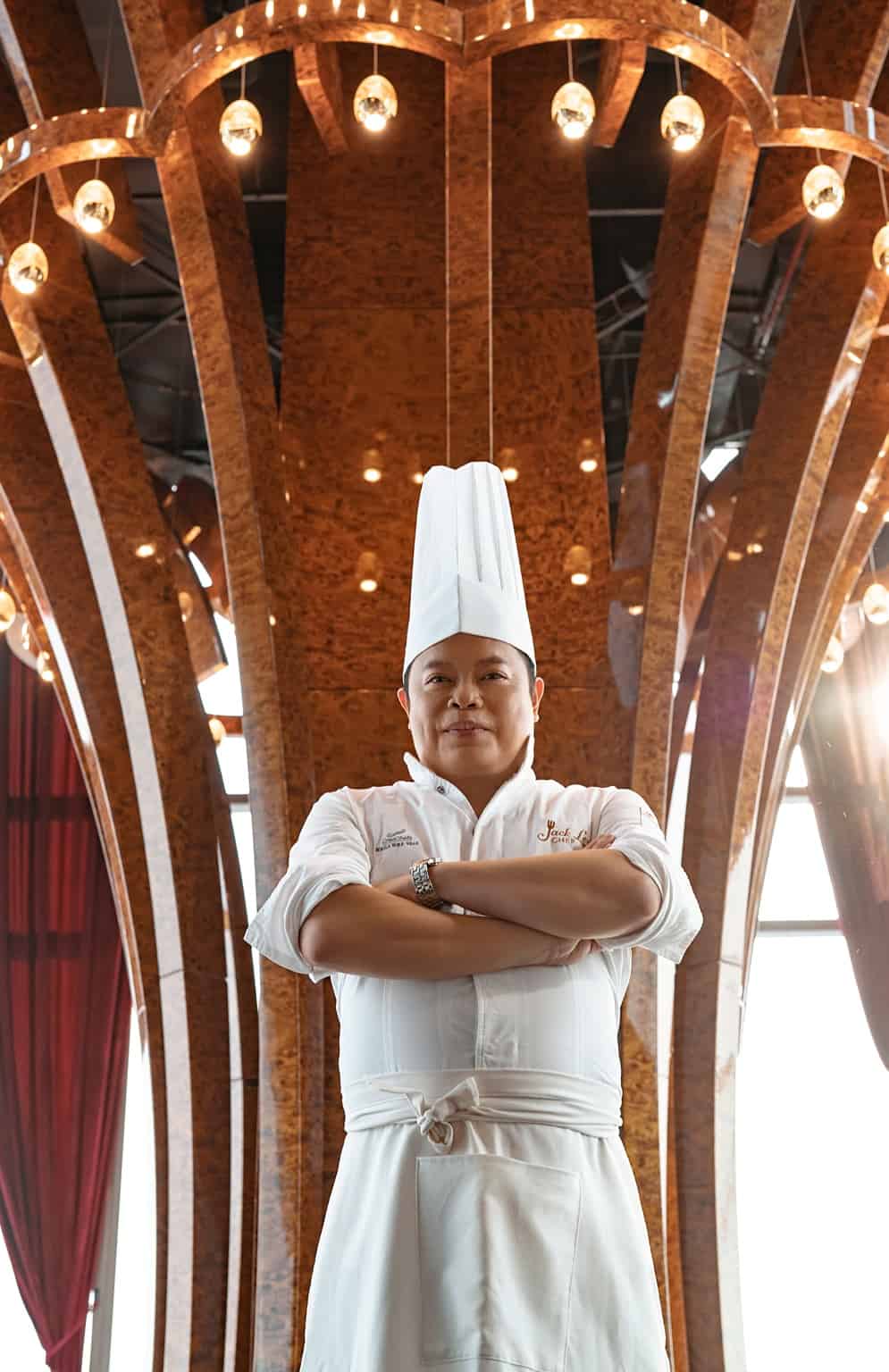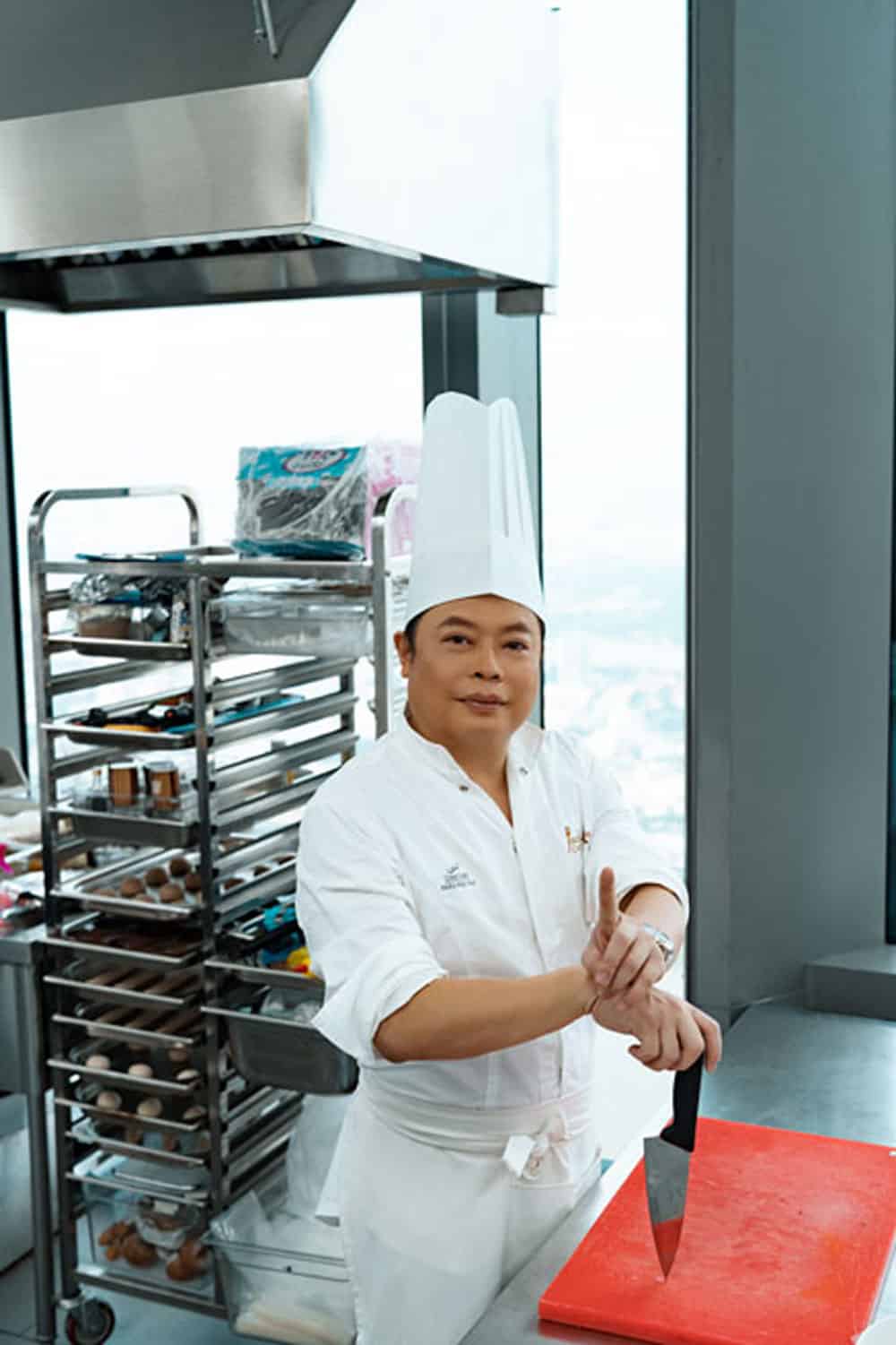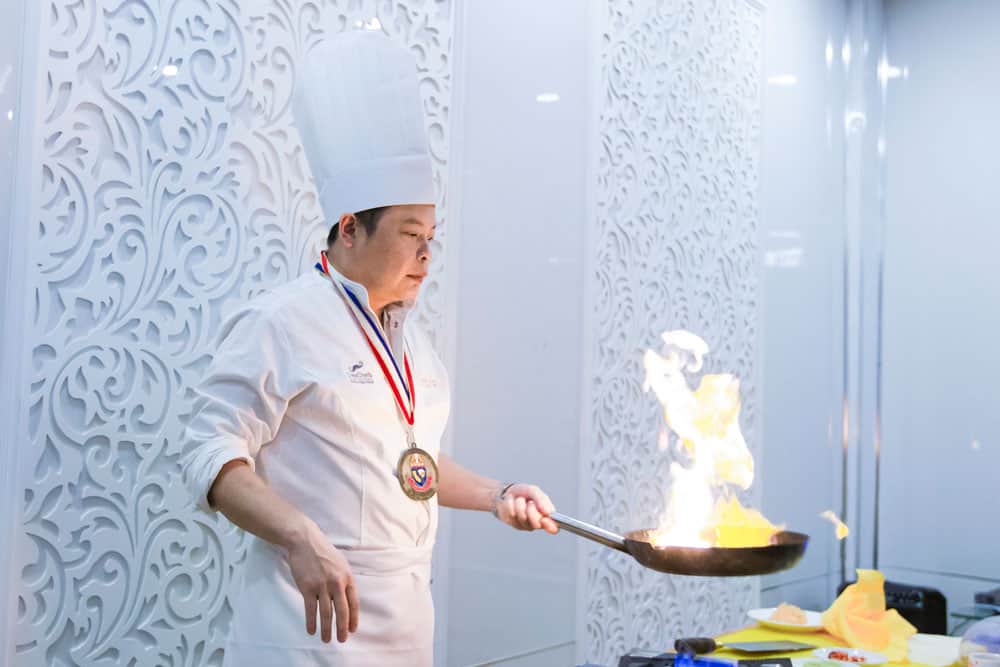
What are the three main reasons you became a chef?
My early childhood was spent in the kitchen with my mom, making bowls of Vietnamese noodles and spreading thick paté on baguettes. Going to the US by boat took that away from me, so being a chef brought back happy memories. I had a lot of false starts in my career, but I kept returning to cooking as the kitchen was my happy place. As a US immigrant, life was rough. I was hooked on a TV show called Three’s Company because it was like a fantasy world. The show’s protagonist, Jack, was tall, white, slapstick-funny and a chef. I learned English watching that show and I named and styled myself after Jack Tripper.
Have you ever regretted becoming a chef?
Never; it has allowed me to be creative, meet amazing people, explore myself and the cooking traditions of my birth and adopted countries. I wouldn’t exchange my job for the world. The only thing I could say to aspiring chefs is that the long hours in the kitchen are tough. There is a common saying that most chefs in America know: we come for the long hours and stay for the low pay!
Now that you are based in Vietnam, what has life been like? What motivates you?
I’m so grateful to be back in Vietnam. It has allowed me to grow as a chef and public figure. Vietnam helped me rediscover my passion for cooking after having lost my sense of taste following surgery. I have discovered national fruits that I forgot existed- jackfruit, dragon fruit, soursop, mangosteen, papaya. These flavors rekindled my energy.
How did your traumatic post-war experiences shape your career?
I was born to a Chinese family in Saigon but after the tanks came, things were different. There were war remnants everywhere: a friend of mine found an unexploded grenade and I saw what happened when he pulled the pin. One day my Mom tells me we’re going on a joy ride… next thing I know I’m on a beach with all siblings getting on a fishing boat in the middle of the night. Only three of us made it, my aunt, younger brother and me. I nearly drowned before spending 3 days with 83 people cooking in the sun on a tiny deck; the stench was incredible. A Norwegian freighter carried us to Singapore where we sat in a refugee camp for America. All I wanted, though, was to be home cooking with my mum. My life in the US was overshadowed by my childhood trauma and the tough existence we had as war immigrants. Cooking connected me to my past and my work ethic was unrivalled due to the heavy responsibility to support family back in Vietnam.
Did you attend culinary school or come up “the hard way”?
I first worked in Chinese restaurants as a young kitchen hand yet my school grades suffered. My family wanted me to go to medical school but I wanted to cook. However, it was years before I decided to pursue my passion enough to get a kitchen job. I walked into the best kitchen in the world – the Hotel Bel-Air and wandered in to apply for a job in my cheap suit and clip-on tie. They pretty much threw me out but I’d seen paradise and was obsessed with it. I spent my savings on an elite cooking school and my mentor got me an internship at the Bel-Air. They weren’t exactly happy to see me after stalking their staff but they were obliged to take me on.
What did you like best about your career path?
Food is a vehicle for creativity and expression. I love working with colors and fresh ingredients, I always find that inspiring. It’s exciting to be participate in cooking trends. Finally, it has also allowed me to meet interesting celebrities and inspire young kids who want to cook.
Where did you get your practical kitchen training? From whom do you think you learned the most?
Mainly on the job at the Hotel Bel-Air. My mentor was Humberto Contreras, the genius executive sous-chef. He was a Mexican immigrant, hardly the right face for the most luxurious kitchen in America, but he mastered their cuisine. It took me a long time to earn his respect, but when I got it, he taught me more than anyone else.

Your career saw you cook for many celebrities – tell us more about this please?
After my time at Hotel Bel-Air, I grew my own business catering for elite clientele. I cooked for the Oscars, parties for Oprah and Clint Eastwood. I did catering for Brad Pitt and Angelina Jolie; I cooked for Jackie Chan, Chow Yun-Fat, Quincy Jones, Jacqueline Bisset, Randy Jackson and a lot more I signed to never to disclose.
Who is a more clientele, celebrities or “regular” guests?
The more famous people are, the more critical. Part of the reason is that they have to watch what they eat. Celebrities, actresses, they’re always worrying about their weight and body shape. Or they may want to be seen as animal friendly. It’s not like the 60s or 70s when it was all meat & potatoes—nowadays the celebs are into the trends: Paleo, Keto, no sugar. It’s harder for chefs to survive in that world.
Tell us about a particularly challenging celebrity situation you had, and how you handled it?
I had a business called Chinoise Catering. We were often contracted by wealthy clientele which occasionally meant working on jobs that required absolute discretion. One client put a paper bag over my head so I couldn’t see where we were going. We drove for miles and when I got there I realised it was an event for the mob; big shot gangsters were meeting and they had very strict requirements and high expectations. I was extremely nervous, but somehow managed to meet their needs, all the while watched closely by big goons with guns. They tried to pay me in cocaine! I was so nervous I could barely speak, but I communicated that I wanted cash and so they laughed and threw me a roll of bills. That was one of the best paying gigs I ever had.
What are the main benefits of your vivacious sense of humour?
I see life in a fun way. Even when cooking under pressure, it has to be fun. As a chef facing the public and his diners, you need an attitude that can break the ice so as a chef, I’m always friendly.
Is there a chef you admire the most? Who and why?
Anthony Bourdain is one of my greatest inspirations and someone I dreamed of meeting. It was to my great shock to hear of his passing. Anthony Bourdain brought culture and cuisine together and did a great service for the promotion of the Vietnamese culinary spectrum to international audiences. I’ll never forget seeing him dine on street Vietnamese noodles and beer with Obama, showing the world how food can unite us all. I am truly heartbroken to have lost the chance to shake the hand of one of my greatest heroes.
How many different types of cuisine are in your repertoire?
At the Hotel Bel-Air I had countless opportunities to cook with visiting chefs from all over the world, meaning I learnt the tricks of the trade for many cuisines. But my core styles are always Californian French and Vietnamese French. They’re my heritage, they bring together all my experiences in life.

What is your personal favourite style to cook, and why?
My formal studies were in Californian French, and that remains my favorite style to cook. I find it tastier and lighter than the classical French style.
What is your favourite wine, and why?
My favorite wine is Cabernet Sauvignon, it is full bodied and goes with everything. People are generally attracted to red wine, especially people from Chinese backgrounds as red represents luck, it has a kind of fascinating appeal.
What wine and food pairing trends have you noticed lately?
People traditionally pair white wine with fish, but now it’s getting popular to take fish with a pinot noir.
Wine with cheese – white or red?
It depends on the cheese and mood. Generally, we go for whites with lighter cheeses and reds with harder, more substantial cheese.
What are the three most interesting current culinary trends you see? Do you think the current vegan and vegetarian trends are hype or substance, and why?
I’m interested in Sous Vide which is very slow to cook but you can cook in advance and heat it up, which is a popular method. Molecular is an interesting new trend from Europe, fascinating and beautiful. Vegan is all about the Millennial and Gen Z fascination with health. It’s good to see how young people are influencing the world of cuisine, their energy results in new cuisines emerging. That’s why we have all these new cuisines emerging, it’s thanks to their energy.
Farm-to-table versus using only the best ingredients from wherever?
Both have advantages. F2T allows you to be sure you’re eating organic, healthy produce. It has a convenience factor; whatever you grow, you can use. It also supports local economy.
Who should have the last word in menu development and design?
I might be biased if I say the chef! Creatively, the chef’s contribution is important regarding each dish’s structure yet you have to consider the owner’s budget. If the chef works well with the management, it’s a win-win situation.
What are the three best ways to handle the often tense relationship between kitchen and service?
Communication. Both sides really need to understand what the other is doing and offer support; back supports front, front supports back.
When are you happiest at work?
I’m just happiest when people love my food. Seeing people appreciate my hard work is always a buzz.I put a lot of thought and sacrifice into what I do, so it feels great when my presentation is appreciated.
What is your favorite cuisine to eat?
My favorite food to have with family is simple home cooking. I’ve seen so many restaurants already, so I really feel most relaxed to have soul food, friendly family treats. Vietnam has a lot of this, the can chua, the lau, even the Chinese dimsum.
If you would not have become a chef, what other career would you have wanted most?
I’ve had lots of side careers, from doing pharmaceuticals to underwear distribution! I looked into studying medicine and I do have an underlying desire to be an architect. Somehow, cooking has always called me back.
What are your next projects, beyond the TV career?
I’ve been developing products to sell on the American market under my Mr. Ready brand but am more interested in starting a charity foundation, a culinary school for poorer kids wanting to develop skills for a career in cheffing. It’s a way to give back what Vietnam, the US and life has given to me.

